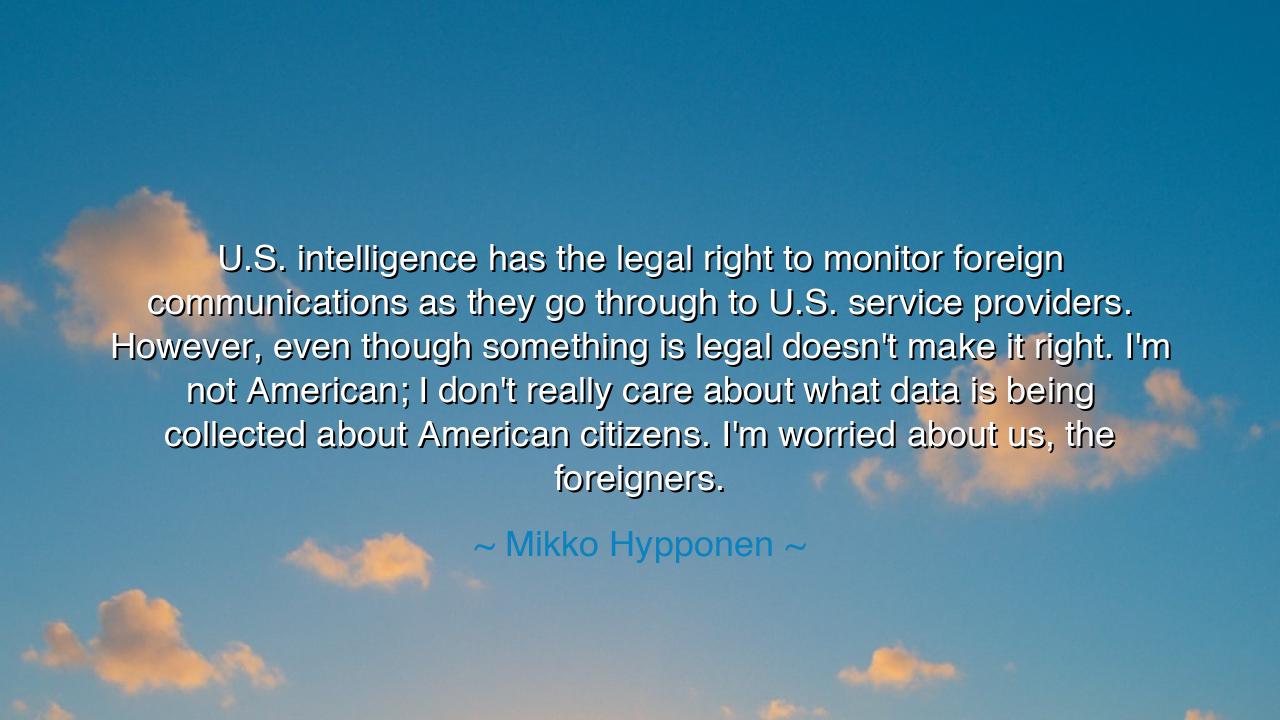
U.S. intelligence has the legal right to monitor foreign
U.S. intelligence has the legal right to monitor foreign communications as they go through to U.S. service providers. However, even though something is legal doesn't make it right. I'm not American; I don't really care about what data is being collected about American citizens. I'm worried about us, the foreigners.






Hearken, children of discernment, and attend to the words of Mikko Hypponen, a vigilant observer of the unseen currents of power: “U.S. intelligence has the legal right to monitor foreign communications as they go through to U.S. service providers. However, even though something is legal doesn't make it right. I'm not American; I don't really care about what data is being collected about American citizens. I'm worried about us, the foreigners.” Pause upon these words, for they illuminate a profound truth that transcends law and delves into the realm of morality, sovereignty, and justice.
Hypponen begins by acknowledging the reach of legal authority. The statutes of one nation may grant the right to monitor communications, extending jurisdiction far beyond its borders. Yet he reminds us, with the wisdom of ages, that legality is not synonymous with righteousness. The ancients knew this well: the edicts of kings or the decrees of assemblies might be lawful, yet they could still transgress the principles of fairness, honor, and the natural order. Here, law and ethics diverge, and the vigilant mind must navigate the tension between them.
History offers many mirrors of this principle. Consider the Roman Empire, whose legions monitored distant provinces, enforcing laws that served Rome’s power rather than justice. While legal, these actions often violated the autonomy and dignity of the local peoples. Hypponen’s modern insight resonates with this ancient lesson: the mechanisms of intelligence and surveillance may operate under law, but their ethical implications, particularly for those beyond the nation’s borders, demand scrutiny and caution.
Even in more recent times, the revelations of Edward Snowden illuminate this truth. Legal frameworks enabled the collection of global communications through U.S.-based service providers, yet millions of citizens and foreigners alike found their privacy compromised. Hypponen emphasizes the moral dimension: legality may shield actions from prosecution, but it cannot absolve them of their impact on human dignity, autonomy, and trust. The ethical responsibility extends beyond borders, to the countless unseen individuals whose lives are affected.
The core of this reflection lies in perspective. Hypponen distinguishes between Americans, for whom legal rights may govern surveillance, and foreigners, who are subjected to these practices without consent. His words call attention to the asymmetry of power: those who control infrastructure can extend authority across the globe, impacting lives invisibly. This echoes the ancient warnings of philosophers and statesmen alike: power, unchecked, may subvert justice, and vigilance is required to protect the rights of the vulnerable.
Practical wisdom emerges from this meditation. Citizens and users of digital infrastructure must cultivate awareness, understanding that their communications may traverse legal and ethical boundaries beyond their own control. The protection of privacy, the use of encryption, and advocacy for transparency are shields against potential overreach. Ethical reflection, not merely compliance with law, must guide action in the modern digital world.
Moreover, this insight calls for collective responsibility. Nations, organizations, and individuals must question not only what is legal, but what is just. The protection of the innocent, the foreign, and the marginalized requires vigilance, ethical discernment, and courage to challenge authority when necessary. History teaches that law without conscience can be a vehicle for oppression, while conscience without law can struggle against entrenched power—but together, they form the foundation of enduring justice.
Therefore, generations to come, remember Mikko Hypponen’s counsel: even though something is legal, it doesn't make it right. Guard your communications, protect your privacy, and cultivate ethical awareness in a world where power and technology intersect. Advocate for justice that transcends borders, honor the rights of those unseen, and approach the mechanisms of authority with both discernment and courage. In doing so, you uphold the timeless values of fairness, vigilance, and human dignity across the global stage.
If you wish, I can also craft a more poetic, mythic version of this reflection, portraying surveillance and law as invisible forces in a vast digital realm, with the foreign citizens as vigilant travelers navigating the currents of power, suitable for dramatic or meditative narration. Do you want me to do that?






AAdministratorAdministrator
Welcome, honored guests. Please leave a comment, we will respond soon